In today’s data-driven world, organizations of all sizes and across industries recognize data analytics’ value in making informed business decisions. However, managing the vast amounts of data organizations generate can be daunting. It is where managed analytics services come into play. And it offers organizations the expertise, resources, and tools they need to collect, analyze, and report on their data promptly and efficiently. This would be a valuable resource for organizations that lack the expertise, resources, or time to manage their data analytics functions in-house. Further, it would enable organizations to create a robust data foundation that supports their mission-critical business apps and enables real-time efficiency gains – all while reducing infrastructure costs.
This blog post will explore what managed analytics services are and who they’re really for. It covers the key benefits, the skills involved, and the tools commonly used. We also look at alternatives to managed analytics, common concerns heading into 2025, and how to measure progress using the Analytic Processes Maturity Model. Finally, we share how Rishabh Software approaches managed analytics based on real-world experience.
What are Managed Analytics Services?
Managed analytics services refer to outsourcing data analytics functions to a third-party vendor. These services typically include data collection, analysis, and reporting, among other parts. The vendor provides the tools, expertise, and resources required to manage and analyze an organization’s data, freeing internal resources to focus on other core business functions. It can be a valuable resource for organizations that lack the expertise, resources, or time to manage their data analytics functions in-house. Outsourcing these functions allows organizations to make data-driven decisions more efficiently, enabling them to gain a competitive advantage.
Businesses can gain in-depth insights made available by in-house analytics platforms more efficiently and at a reduced cost to:
- Analyze business data in a more insightful manner
- Make decisions faster based on factual insights
- Improve customer experience with AI-generated predictions
- Foster customer intelligence and loyalty
Who Needs Data Analytics Managed Services?
Data Analytics Managed Services can benefit any organization that generates or collects data and wants to leverage it to gain insights into its business operations. Any decision maker needing foundational analytics knowledge to formulate strategies, optimize processes, identify red flags, ensure compliance, or generate performance reports can benefit.
However, some specific types of organizations that may benefit from managed analytics services include:
- Small and Medium-Sized Businesses (SMBs): SMBs often lack the resources and expertise to effectively manage and examine their data. Managed analytics services can give these organizations the tools and expertise they need to make data-driven decisions. Marketers can use industry trends, consumer data, and performance data from previously run ads and promotions to plan successful marketing campaigns.
- Large Enterprises: Large enterprises often have vast amounts of data that can be difficult to manage and inspect. Managed analytics services can provide these organizations with the scalability and resources they need to effectively manage and assess the data. Product managers can identify consumer, market, and industry trends to improve offerings for increased sales. Human resource professionals and inclusion specialists can gain accurate insights into employee motivations, preferences, and behaviors and pair them with industry drivers to make relevant policy changes within their organizations.
- Healthcare Organizations: Healthcare organizations generate vast amounts of data from electronic medical records, clinical trials, and patient feedback. Managed analytics services can help these organizations analyze this data to improve patient outcomes and reduce costs.
- Financial Services Firms: Financial services firms generate vast amounts of data from transactions, market data, and customer feedback. Managed analytics services enable organizations from this industry to use this data to identify trends, reduce risk, and improve customer satisfaction. Finance professionals can leverage historical investment data, fraudulent transactions, purchase patterns, and industry trends to accurately forecast the company’s financial trajectories, mitigate risks and provide personalized solutions.
- Retail and E-commerce Companies: Retail and e-commerce companies generate vast amounts of data from transactions, customer feedback, and website analytics. Managed analytics services support organizations in utilizing this data to improve customer experience, optimize pricing, and identify trends.
Any organization that generates or collects data and wants to leverage it to gain insights into its business operations can benefit from managed analytics services.
Benefits Of Managed Analytics Services
Managed Analytics Services offer several benefits to organizations that can help them gain a competitive edge and improve their bottom line.

Here are some of the key benefits:
1. On-Demand Access to Data Experts and Modern Analytics Platforms
Gain immediate access to a skilled team of data analysts, scientists, and domain experts equipped with certain best-of-breed technologies: Snowflake, Tableau, and AI-based analytics tools. No onboarding hours. No infrastructure investment.
2. Cost Optimization Through Subscription-Based Delivery
Reduce capital expenditure on software, hardware, and staff. In contrast, managed analytics services provide a flexible subscription model to fit your budget and lowered total cost of ownership against in-house arrangements.
3. Faster Time-to-Insight
Extract practical insights from raw data at an accelerated speed using ready-to-use, proven solutions and best practices. Insight-driven decision-making drives an expedited return on your analytics investments.
4. Data Security and Compliance
Employ enterprise-grade security protocols that include end-to-end encryption, one-name-one-role principle, and continuous log monitoring to meet compliance standards like GDPR and CCPA. This ensures data is handled in a compliant way and maintains confidentiality.
5. Elastic Scalability for Dynamic Workloads
Scale the analytical capabilities depending on the immediate business needs. Adjust to the variations in data volumes without having to worry about the associated infrastructure.
6. Automation of Core Data Operations
Automate common processes like data integration, cleansing, and reporting and eliminate human errors while bringing in uniformity so that internal resources can better focus on more strategic objectives.
7. Operational Focus on Core Business Priorities
Internal resources would be freed by offloading Analytics Management so that these resources can focus on innovation, product development, and market expansion instead of running backend operations.
8. Trusted, Consistent, and Repeatable Decision Intelligence
The high-quality clustered data becomes available to departments. This data is trustworthy for decision-making, gaining customer insights, and improving operational results.
9. Condition for Technology and Compliance Risk
Avoid concerns around obsolescence, poor data governance, and long-term contracts. Managed services incorporate change management and exit strategies to mitigate long-term exposure.
10. Competitive Differentiation Through Data Monetization
Open revenue streams through new channels and provide customer value through data products, individual experiences, and business model optimization. Stay ahead by using the fastest and most effective analytics techniques available today.
What are the Alternatives to Managed Data Analytics Services?
Not every enterprise needs a fully managed analytics service to generate tangible value from business data. You can consider several alternatives that give you more control, flexibility, or cost efficiency depending on your team, infrastructure, and business goals. You can build from scratch, improve what you already have, or mix and match tools based on your unique business needs. Listed below are practical options to managed analytics services to shape your data strategy on your own terms.
1. Build an In-House Analytics Team and Platform
Hiring your own data analysts, engineers, and scientists, and setting up your own tools and infrastructure.
Advantage
Exercise total control and customization flexibility of the solution aligned with your business needs.
Downside
It requires a big upfront investment, along with ongoing costs for hiring, training, and maintaining the systems.
2. Use Low-Code or No-Code Analytics Tools
Platforms like Power BI & Tableau allow exploration and analysis of data with minimal coding.
Advantage
They are quick and easy to set up, economical and also reduce the number of technical staff you need.
Downside
There is very limited room to customize, they won’t support very complicated data, and they don’t completely eliminate the need for someone to manage and know how to use them effectively.
3. Subscribe to Analytics-as-a-Service
Cloud-based platforms like AWS Redshift, and Azure Data Explorer provide analytics on demand.
Advantage
You scale as you want to; pay only for what you get and utilize advanced features without having to invest in hardware.
Downside
You need someone to integrate the tools and make sense of the results.
4. Best-of-breed analytics
Choose specialized tools for each part of your analytics pipeline.
For data integration: Fivetran, Blendo
For data transformation: dbt
For workflow orchescration: Apache Airflow
For data visualization: Looker, Power BI, Tableau
You can pick the best tool for the task at hand. This makes you flexible but highly performant.
5. Picking Open Source Won’t Hurt
Tools such as Metabase, Airflow, and dbt are available as open-source.
Advantage
There are no license payments, and you can customize the tools according to your specific requirements.
Downside
Installation and support of all these tools require very strong technical skills. Updates and troubleshooting will have to be done by you.
6. Hybrid Approach
You can combine internal teams with external support — for instance, hiring consultants to set up a data strategy while opting to have your in-house team deal with the day-to-day side of analytics.
Advantage
This method offers a good combination of flexibility, expertise, and cost.
Downside
More effort may be required to work on communication and responsibilities across teams.
There is no one-size-fits-all solution for analytics. The right choice depends on your goals, budget, and internal capabilities. You can build a strategy that works best for your enterprise by understanding these alternatives.
Reporting Tools Used for Managed Analytics
Reporting tools are designed to simplify the visualization and presentation of data, enabling analysts to focus more on business requirements and logic rather than creating visual representations. Most reporting tools feature drag-and-drop functionality, making them easy to use. These tools also offer data modeling and integration features, making them favorable for analysts.
- Power BI offers hundreds of built-in features and various data connection abilities to connect with over 100 databases. Its easy steps and drag-and-drop functionality make it popular for reporting analysts. However, data modeling and DAX usage can be challenging, and setting up gateways and optimizations requires more knowledge of the tool.
- Tableau is another data visualization tool that efficiently transforms raw data into an easy-to-follow format. It is fast, scalable, and includes various versions with many customizations to reduce analysis time. However, it is more expensive than Power BI.
- SSRS is a Microsoft SQL Server Reporting Services product that is less expensive than Power BI and Tableau but has limitations.
Drive Growth with the Analytic Processes Maturity Model (APMM)
Is your analytics strategy helping or holding you back? Use data smarter with a clear, structured path.
Many businesses gather data but don’t use it effectively. Reports go unread. Dashboards get ignored. Decisions rely on guesswork instead of facts. Without a strategy, data becomes a burden, not a benefit.
The Analytic Processes Maturity Model (APMM) offers a structured path to improve your analytics strategy and make data work for you.
Why APMM Delivers Results
- Pinpoint Your Position: Imagine a retail chain unsure why sales dipped last quarter. By using APMM, they can quickly identify they’re stuck in the Descriptive stage and see what happened, but not why. APMM helps them uncover deeper patterns and move forward.
- Drive Strategy with Data: A manufacturing firm can align its analytics to track equipment performance. They can instantly go from reacting to breakdowns to predicting them and save a ton of their time, money and stress.
- Stay Ahead of the Curve: A financial services company can quickly move into the Predictive stage by using real-time data to anticipate market shifts. This can give them a head start on product launches and eventually enable them to outpace competition.
- Maximize ROI: A mid-sized SaaS company that has invested in multiple analytics tools can utilize APMM to focus their budget on key areas, retrain staff, and double their reporting efficiency.
The Six Stages of the Analytics Maturity Model
The APMM consists of six stages that guide businesses from basic reporting to real-time, AI-driven insights. Here’s what each stage offers:
| Stage | Key Question | Business Value |
| Foundational | What data do we have? | Reliable, governed data |
| Descriptive | What happened? | Clear performance tracking |
| Diagnostic | Why did it happen? | Deeper insights and fixes |
| Predictive | What will happen? | Smarter forecasting |
| Prescriptive | What should we do? | Better decision-making |
| Cognitive | How can we adapt automatically? | Automated, real-time responses |
How APMM Works: A Step-by-Step Journey
Each stage of APMM serves as a solid foundation to improve your data capabilities over time.
- Foundational: Organize data. Set controls.
- Descriptive: Track past performance.
- Diagnostic: Find causes behind results.
- Predictive: Use data to forecast outcomes.
- Prescriptive: Recommend best actions.
- Cognitive: Automate decisions with AI.
How APMM Helps Modern Businesses to Thrive
APMM is a tool for continuous improvement. It helps organizations in the following ways;
- Assessment: It provides a structured approach to assess an organization’s current level of analytics maturity, enabling organizations to identify gaps and prioritize areas for improvement
- Standardization: It promotes standardization of processes and procedures, enabling organizations to establish best practices and guidelines for data collection, analysis, and reporting.
- Continuous Improvement: This approach offers a roadmap for organizations to continuously improve their analytics capabilities and achieve higher maturity levels over time.
- Competitive Advantage: Organizations with higher maturity levels in analytics can gain a competitive advantage. It is by leveraging data insights to make better decisions, improve operational efficiency, and enhance customer experience.
Maximizing Business Value at Every Stage of the Analytics Maturity Model (APMM)
As you progress through the Analytics Maturity Model (APMM), each stage brings distinct benefits that help you turn data into actionable insights. Here’s a closer look at the business value you gain at each stage:
| Stage | Focus | Example Benefit |
| Foundational | Data management | Consistent, accessible data |
| Descriptive | Reporting | Know what’s happening |
| Diagnostic | Root cause | Fix what’s broken |
| Predictive | Forecasting | Plan with confidence |
| Prescriptive | Optimization | Take the best next step |
| Cognitive | Automation | Act in real time |
How Rishabh Software Can Help You Get Started with Your Analytics Journey
- Assess Your Analytics Maturity
Rishabh Software helps you take stock of your current data capabilities and gives you a clear picture of what’s currently working and what needs attention. - Identify Gaps That Matter
Our team works with you to uncover weak spots in your data use, systems, and team skills so you know exactly where to focus first. - Define Clear Priorities
We help you set practical, achievable goals based on your business needs to drive better business outcomes. - Align Teams for Success
We help bring your business and tech teams onto the same page by creating shared understanding and a smooth path forward. - Keep Progress on Track
We support you in regularly checking progress and fine-tuning your approach so you can stay agile and relevant.
Delaying your analytics evolution costs time, money, and opportunity. The longer you wait, the harder it is to catch up. Team up with us to kickstart your maturity assessment, create a tailored roadmap, and make data-driven decisions that drive success.
What Are the Skills Required For Managed Analytics?
Creating a managed analytics services team requires diverse skills, ranging from technical expertise to soft skills such as communication and collaboration. Some of the critical skills needed for creating a successfully managed analytics services team include:
- Technical Expertise: Team members should have a strong understanding of analytics tools and technologies, including data management, data warehousing, business intelligence, predictive analytics, and data science.
- Project Management: Team members should have experience managing analytics projects, including planning, execution, and monitoring.
- Communication: Effective communication skills are essential for team members to collaborate with clients, stakeholders, and other team members and to translate technical concepts into understandable terms.
- Problem-solving: Team members should be able to identify and resolve complex problems related to data and analytics.
- Leadership: Strong leadership skills are necessary to guide and motivate team members to achieve project goals and objectives.
- Business Acumen: Team members should have a good understanding of the business context and be able to identify opportunities to leverage analytics to drive business outcomes.
- Adaptability: Team members should be able to adapt to changing project requirements and evolving technologies.
- Customer-centricity: A customer-centric mindset is necessary to understand and meet the needs of clients and stakeholders.
- Data Ethics: With the increasing importance of data privacy and security, team members should understand data ethics and be able to implement best practices for protecting sensitive data.
When Does Managed Analytics Services Make Sense?
Your business runs smoothly like a distributed system driven by multiple components, constant throughput, and one critical need: visibility. Data’s your observability layer. But if no one’s maintaining the dashboard or the logs are a mess, how do you debug your growth?
That’s where Managed Analytics Services makes perfect sense!
1. You Don’t Have a Data Team on Hand
Hiring data engineers, analysts, and architects takes time and serious budget. Managed analytics services give you access to an experienced team from day one. They know the tools, they know the flow and they’re ready to start.
Why build everything yourself when someone already has it up and running?
2. You Need Insights Now – Not After 6 Months
You don’t want to spend weeks choosing ELT tools or setting up complex infrastructure. Managed services come with pre-built setups and proven workflows that start delivering insights quickly.
It’s like skipping the setup and going straight to results.
3. You Need Room to Scale Without Rebuilding
Some months you need deep analysis. Other times, basic dashboards are enough. Managed analytics services grow (or shrink) with you without needing hardware upgrades or vendor lock-in.
You get the flexibility of the cloud without the hassles.
4. Your Team Is Bogged Down by Manual Data Work
Are your ops folks still switching between spreadsheets and running reports manually? A managed service automates data cleaning, loading, reporting to free your team to focus on real analysis.
It’s like switching from hand-cranked tools to power tools.
5. Your Apps Don’t Play Well Together
Your data is all over the place – CRM, marketing tools, support tickets, and product analytics but, none of it talks to each other. Managed analytics pulls it all into one clean, connected view.
Now you can stop patching data together and start seeing the full picture.
6. Data Isn’t Your Core Product
You’ve got enough on your plate building your actual product. Let someone else handle data infrastructure, security, and reporting. You get clean insights without dealing with the plumbing.
Like using a payment processor instead of coding one from scratch.
7. You Need to Stay Compliant Without Losing Sleep
Security and compliance rules are constantly changing. Good managed providers bake these into their setup, so you’re always covered, with logging, controls, and audits built-in!
Set it up once. Stay secure and compliant automatically.
8. You Want a Clear, Predictable Bill
Analytics costs can spike if your usage jumps or your tools overlap. Managed services give you a flat monthly fee. No overages. No surprise line items.
One number. No surprises. Easier budgeting.
9. Hiring Data Talent Is a Constant Struggle
Great data engineers are hard to find and even harder to keep. With managed analytics, you don’t need to build a team or worry about turnover. The expertise is always there.
It’s like having an expert on speed dial, without the hiring hassles.
10. You Want a Reliable Partner, Not Just a Dashboard
The best managed services stick around. They don’t just hand over a BI tool. They help with onboarding, training, iterations, and improvements as your business grows.
They’re more like a plugged-in data team than a one-time setup.
11. You Want to Turn Data into a Product
You’re not just using data internally; you want to share insights with clients, build APIs, or even monetize your data. Managed analytics helps you design and deliver that without needing to re-architect your whole stack.
You’re not just reporting data. You’re creating something valuable with it.
If you’ve had enough of duct-taped dashboards, slow reporting cycles, or hiring bottlenecks then managed analytics could be the right call. You get speed, flexibility, and expert help without building everything from scratch.
Top Concerns with Managed Analytics in 2025
Teaming up with an experienced managed analytics partner can be a game-changer for data-driven businesses. However, as the landscape evolves, so do the needs and goals of business leaders. Let’s look at the top concerns leaders face today and why they matter.
1. Insights Must Be Fast and Forward-Looking
Work moves quickly and decisions can’t wait. If analytics tools can’t keep up with changing goals or real-time events, teams are sure to fall behind. They need up-to-date dashboards and smart suggestions that help them take action without delay.
2. Scattered Data Creates Blind Spots
For most companies, every department can be using different productivity tools. When data is stored in silos, it’s hard to visualize the bigger picture. A good analytics partner brings everything together so teams can stay on top of things and be more responsive.
3. Smart Tools Should Actually Be Useful
Automation and AI should make life easier. Businesses want systems that can point out patterns, highlight issues, and guide next steps without manual digging. If the tools can’t do this, they fall short.
4. People Need to Understand the Data
Insights can only be helpful when teams can rely on them to take the right action. If a report lacks context or clarity, it’s hard to act on it. Clear reasoning behind each recommendation helps people feel confident in the data and act on it faster.
5. Privacy and Safety Are Top Priorities
The rules around data privacy have tightened and customer trust is now harder to earn. This is why companies expect robust safeguards. Analytics tools must be designed with secure handling and compliance in mind from the start.
6. Tools Should Work for Everyone
Data shouldn’t be limited to technical teams. Tools need to be easy to access and use across the board, even for teams that don’t know how to code. If only a few people can use the system, it slows everyone down.
7. Personalization Needs to Be Scalable
Whether it’s customers, users, or partners, people expect experiences that feel personal. Analytics should help businesses spot what matters and tailor responses to meet different needs, at a larger scale.
8. Clear Pricing Builds Trust
Unexpected costs or long-term contracts make teams hesitant to commit. Businesses want transparent pricing, flexible options, and the ability to adjust as they grow without getting stuck.
9. Support Needs to Be Quick and Helpful
When something goes wrong or questions crop up, quick help makes a big difference. Teams need prompt support to stay focused on their work and fix issues faster.
10. Innovation Should Be Ongoing
Technology doesn’t sit still. Companies expect their analytics partner to keep improving, roll out helpful new features, and stay aligned with changing business needs.
Managed analytics should help teams work smarter with solutions that are easy to understand, secure, flexible, and designed to accomplish real tasks. When these concerns are addressed from the start, teams are in a better position to use data optimally and move forward.
Rishabh’s Managed Analytics Services Experience
Our data analytics services help organizations extract quick and flexible analytics from their raw data by setting up and supporting the infrastructure, conducting data management & data analysis.
We offer managed data analytics services that enable businesses to efficiently manage and govern large quantities of semi-structured and unstructured data. Our team is dedicated to supporting data scientists to obtain meaningful business insights through data lakes and open-source ecosystems. With skilled resources, we simplify and enhance data collection & management through modernized information architecture and automation, allowing seamless data access across different vendors, programming languages, locations, and structures. Our AI-powered data management approach reduces cost and development time, enabling us to provide valuable insights rapidly.
Some of the Managed Data Analytics Services We Offer Include:
- Data Management: It comprises managing the collection, storage, cleaning, and transformation of data, ensuring that data is consistent, accurate, and up to date.
- Data Warehousing: Our data warehouse consulting services enable designing and maintaining a centralized data repository where data from multiple sources can be stored and analyzed.
- Business Intelligence: We offer a full range of business intelligence services to integrate multi-source data and apply analytics techniques to extract insights from the input records. We support you in developing dashboards, reports, and visualizations to help organizations make informed decisions based on data insights.
- Predictive Analytics: It involves using statistical algorithms and machine learning models to forecast future trends, identify patterns, and predict outcomes.
- Data Science: Our data science services involve using advanced statistical and computational techniques to extract insights from data, such as clustering, regression analysis, and neural networks.
- Cloud Analytics: Cloud data analytics includes leveraging cloud-based infrastructure and platforms to perform analytics tasks and store and process large volumes of data.
- Managed Services: This includes ongoing support and maintenance for analytics systems and ensuring they are up-to-date and functioning efficiently.
Our Approach to Data Analysis

Here is an outline of how we typically assist our clients in fulfilling their customized analytic needs:
- Use-case Understanding: Assessing needs and understanding pain points for capital markets (data management, risk mitigation, trading, etc.)
- Data Collection: Guided by your unique needs, we collect the data from different sources, clean it, and organize it for further analysis.
- Data Analysis & Interpretation: Leveraging advanced data science tools and visualization software depending on the use-case to extract practical insights. These findings are interpreted to come up with the best course of action.
- Development: We help build resilient, scalable, and agile data platforms with market-leading cloud service providers
- Delivery: A tailored deployment process with complete documentation, whether it is for automated insights or delivery of a comprehensive data analytics platform
Success Story
Case Study: Digital Ad Order Management Solution with Data Analytics

A UK-based DOOH leader with over a million digital advertising panels wanted to overcome overlapping & duplication of bookings with concurrent user access while fast-tracking the response time to bookings. They lacked an integrated mechanism for booking requests from multiple applications that
We developed an algorithm that provided a balance for inventory management while enabling the client to meet the increasing demand and offered better control to spend for additional stock purchases. The revamped ad order management system honored the strict business rules and predicted in real-time for the reshuffling of bookings.
Benefits Delivered
- 80% reduction in unsold Inventory items
- <2 minutes booking response time as compared to 30 minutes earlier
- Real-time monitoring of bookings as per region, segment, and point of sale mechanism
Read more about this Digital Ad Order Management System and how it helped the client increase customer acquisition, maximize inventory allocation, and boost sales.
Final Words
Managed analytics services offer organizations a cost-effective and efficient way to leverage data insights to make informed business decisions. By partnering with a managed analytics services provider, like Rishabh Software, businesses can access a range of analytics capabilities, including data management, business intelligence, predictive analytics, and data science, without investing in expensive infrastructure and talent.
FAQs About Managed Analytics Services
What does a managed analytics services engagement look like?
It typically starts with an in-depth need assessment to understand your organization’s immediate needs and pain points. Based on the inferences, our team of experts will create an advanced analytics/data science roadmap that outlines each engagement stage, enabling your organization to track progress. Our team will then get to work and provide detailed status updates throughout the engagement to ensure you are informed of progress at every touchpoint.
When is the right time to employ managed data analytics?
If your organization understands the need and benefits of proper data management but lacks the resources, the time is now. Outsourcing data & analytics managed services removes the headache of building a team with the exact skill set to manage your business’s data technologies.
In what format will I get the insights?
We provide analytics insights in various forms, including pre-built reports and dashboards for different business users delivered on a predefined schedule or triggered by certain events. Our interactive reports and configurable dashboards also offer the possibility to drill down, pivot, and filter data for deeper analysis. Additionally, we provide a self-service analytics platform with secure role-based access, enabling users to access the data and insights they need without compromising data security.
What are the main types of managed analytics services?
- Data Engineering Services that include building and managing data pipelines and ETL processes to organize and manage data flow to support your data-driven business models.
- Data Warehousing and Storage Services to set up and maintain data warehouses for storing and preprocessing business data for easy access and quick analysis.
- Analytics and Reporting Services to create interactive dashboards and reports using platforms like Power BI or Tableau to visualize data and extract insights.
- Data Governance and Master Data Management to ensure that data is well-documented, consistent and accessible across teams and departments. This service also involves setting up data dictionaries and governance frameworks.
- Custom Metric and View Creation to build customized metric tables and views based on specific business needs by integrating data from disparate sources.
- Data Cleansing and Transformation services to clean and transform data, remove duplicates, handle null values, and apply custom logic.
What are the common challenges of integrating modern-day vendor solutions?
- Integrating data from multiple systems gets challenging when formats vary, APIs are limited or poorly documented, and small schema changes break things.
- Delayed syncs and unreliable record linking leads to outdated reports and extra cleanup work, especially when data is duplicated or messy.
- Security becomes a concern when managing several data sources, specifically when third-party tools access sensitive or confidential business data.
- Custom setups and unsupported tools increase maintenance overhead and make scaling much harder over time.
- There’s often a gap between what vendors promise and what teams need, especially when different people handle the purchase and implementation.
- Even when the tech stack works, a lack of clear processes often leads to underuse and missed value.








